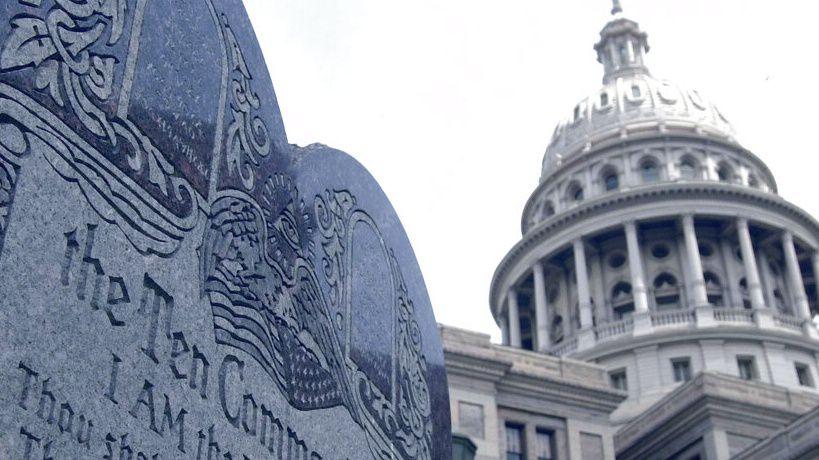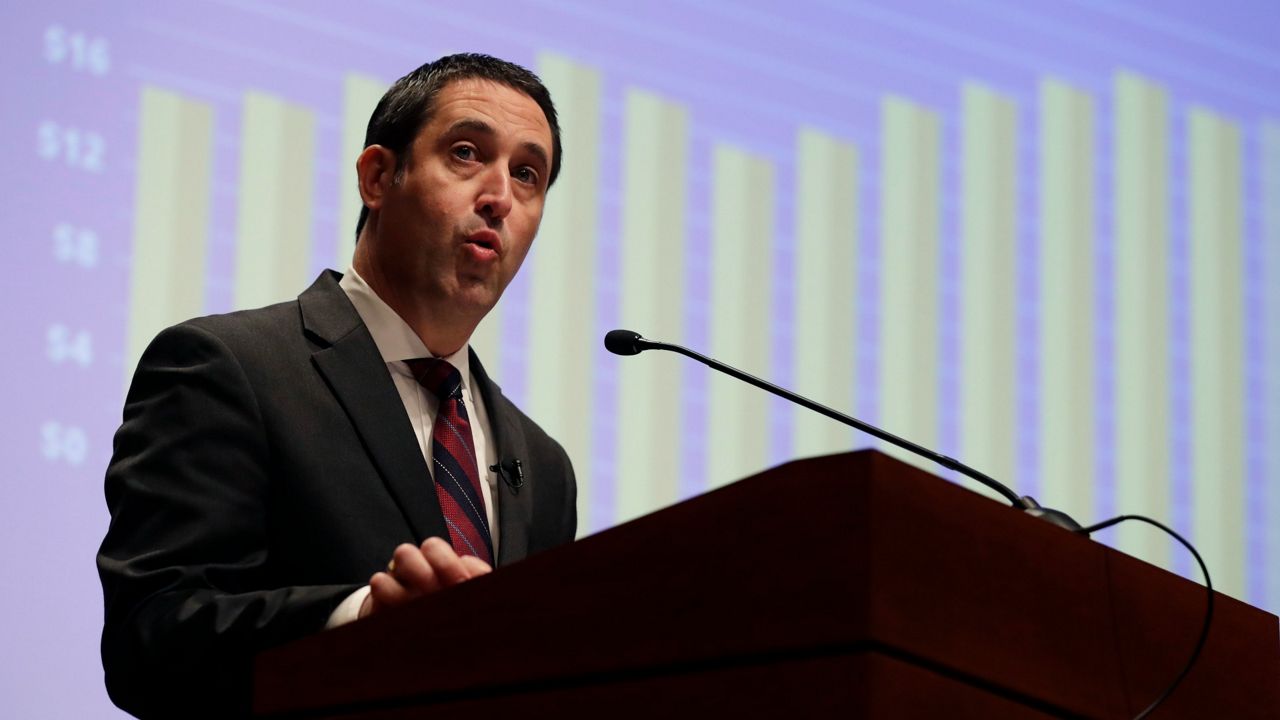AUSTIN, Texas — Two bills that Lt. Gov. Dan Patrick said would expand religious liberty in Texas schools passed the Senate last week with little discussion and no debate.
The first bill, Senate Bill 1515, would require the Ten Commandments to be posted in every classroom. The second, Senate Bill 1396, would allow the boards of public schools and charter schools to approve a time set aside for Bible reading and prayer, as long as that time set aside doesn’t displace instructional time on a campus.
“I will never stop fighting for religious liberty in Texas,” Patrick said in a statement after the vote, which broke down on party lines, 17-12. “Allowing the Ten Commandments and prayer back into our public schools is one step we can take to make sure that all Texans have the right to freely express their sincerely held religious beliefs.”
A loose coalition has formed to oppose both bills and will be active when the bills are scheduled for hearings in the House, said Will Jeurdy, the Texas State Director of American Atheists. Coalition members include Texas Freedom Network, Interfaith Alliance, Americans United for Separation of Church and State, Equality Texas and the Center for Freethought Equality. Americans United submitted a letter signed by national and local members.
“The First Amendment to the U.S. Constitution already protects students’ rights to read the Bible and other religious texts during free time and to pray, so long as it is voluntary, non-disruptive, student-led, and student-initiated,” Americans United wrote in its letter. “But the First Amendment also prohibits public schools from sponsoring prayer or Bible reading and school employees from initiating or participating in these practices with them. This bill would clearly violate the U.S. Constitution and will likely result in costly litigation. Accordingly, we urge you to respect all Texas students, regardless of their religion, and oppose this bill.”
Supporters of both bills are hanging a lot of their argument on a U.S. Supreme Court case of Kennedy v. Bremerton, which was decided last year. The trio of invited witnesses during a hearing on the so-called Ten Commandments bill were from Wallbuilders, an Aledo nonprofit that argues that separation of church and state applies to government directives, not people.
Matt Krause, a former Texas House member, said last year’s Kennedy decision — which allowed a Washington state high school football coach to pray with players after a football game — was to religious liberty what the Dobbs decision was for the anti-abortion movement.
“As Sen. (Phil) King pointed out, just last summer, in the Kennedy v. Bremerton case, the court vehemently disposed of the Lemon test, which means it’s no longer good law, which means those precedents based on that decision are no longer good law as well,” Krause said on behalf of Liberty Institute, the lawyers who represented Kennedy. “So, we think it is ripe for the opportunity there is to ensure kids are able to see the Ten Commandments in their classrooms, no matter where you are in Texas.”
Back in 1980, a parent in Kentucky challenged the mandatory placement of the Ten Commandments in every classroom. The case, which he won, set up what is known as the Lemon test, which is a three-pronged test for protected religious speech: the primary purpose of the assistance is secular; the assistance must neither promote nor inhibit religion; and there is no excessive entanglement between church and state.
The problem for Wallbuilders — and what has not been brought up in public hearings — is that Kennedy v. Bremerton may overturn the Lemon test, but it doesn’t negate the Establishment Clause. School districts cannot burden people’s free exercise of religion, but they also are prohibited from advancing religion or coercing students to join religious activities. That’s the most recent guidance from the Texas Association of School Boards to Texas school districts.
David Barton and Tim Burton, both of Wallbuilders, argue the Ten Commandments are not just a religious document; they are a historical and moral document of great importance to the country. That’s the standard set by the Kennedy decision. David Barton held up an early textbook of the country’s common school era during a hearing in front of the Senate Education Committee, noting that numerous lessons in the book focused on the Ten Commandments.
“There’s no better standard that’s ever been given for a basis for morality than the Ten Commandments,” said Tim Burton. “Not only are the Ten Commandments now legally allowed to be displayed for students, not only is there a historic precedent for them to be displayed for students, but there is a moral component.”
If the United States expects to remain a free society, and for students to understand what is right and wrong, and to refrain from killing and stealing, the country just returned the Ten Commandments to classrooms, Tim Burton said. So, students understand a basis for morality.
Not everyone agrees the Ten Commandments can be viewed merely as a moral document. Sravan Krishna, a Carroll ISD parent, attempted to donate In God We Trust signs to his school board in rainbow colors and in Arabic. His gift, which was intended to emphasize tolerance, was rejected by trustees.
“Our work is dignity for all Texas students,” Krishna said of his group, Dignity for All Texas Students. “We’re about making sure that schools are welcoming for all kids, and it’s not one particular thing. It’s not just religion. It’s whatever race, whatever gender, whatever sexual orientation. All kids should feel safe and welcome in our public schools.”
Putting the Ten Commandments on the wall of every classroom is not necessarily welcoming. It also opens the door to invite teachers to proselytize a Christian message to their students. The message is not tolerant acceptance; it’s Christian nationalism, Krishna said.
Krishna, who is Hindu, was born in India. There, private schools often are the preferred form of education. Krishna initially attended Catholic school, where the idea was not conversion.
“We never looked at it as, ‘Oh my God, if I send my kids to this school, they’re going to change religion,’ right?” Krishna said. “It was always about would it lead to them getting the best education?”
This effort is not the first battle pitched to add religion, and frequently the Christian faith, onto Texas school campuses. It’s an effort that many Republican voters strongly support. Last session, a new law required Texas schools to display donated “In God We Trust” posters.
A decade ago, it was a fight to add electives on the Old Testament and New Testament to Texas high schools as long as 15 or more students on campus requested it. Last year, just under 700 students in Texas enrolled in a Bible elective. That’s about the same number as the students enrolled in the Oral Interpretation elective.









